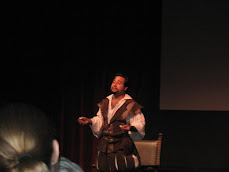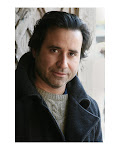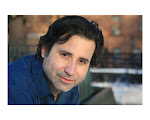BY CHRISTINE DOLEN
CDOLEN@MIAMIHERALD.COM
The argument has been going on for centuries, transcending any particular faith. One thread goes something like this: If there is indeed a God, if He is responsible for man's moral and ethical behavior, why does He allow suffering and tragedy to befall the faithful? How, in particular, could the Holocaust happen?
The Quarrel, a play by David Brandes and Joseph Telushkin that has just opened at GableStage, asks dozens of such questions during the unexpected reunion of two old friends, one a worldly poet, the other a rabbi.
Originally a Canadian film based on a 1950 short story by Yiddish writer Chaim Grade, The Quarrel is now an intense, emotion-filled, provocative piece of theater brought vibrantly to life by director Joseph Adler, starring Avi Hoffman and Chaz Mena and, in a small but incendiary role, Mark Della Ventura.
In less than 90 minutes, Hoffman and Mena paint portraits of two men whose youthful friendship shattered over questions of faith, men who lost everyone and everything during the Holocaust.
In the rhythms of their sometimes volatile debates, they reveal the boys they used to be when they were at a yeshiva in Lithuania, their stolen lives as husbands and fathers, their need to reconnect with the past through each other. The work that Hoffman and Mena create together is so moving that, at the end of opening night, one man tried to speak through his tears and couldn't. He wasn't the only one.
Set in a Montreal park in 1948 -- the moody set, with its stonework and mural of pale trees, is by Lyle Baskin -- The Quarrel turns on the chance meeting of Rabbi Hersh Rasseyner (Hoffman), who is preparing to observe Rosh Hashanah, and Chaim Kovler (Mena), a Yiddish poet who has come to Canada from his home in New York to do a reading.
Though each man is elated to discover the other has survived, their conversation soon moves from old friends and family members to their still-festering differences. It takes a while, but Hersh eventually confesses that when Chaim turned his back on the yeshiva and Judaism, he felt broken.
During a rainy afternoon, the two debate questions of faith and morality as they must have at the yeshiva so many years ago. A brief interruption by Joshua (Della Ventura), one of Hersh's students in his Montreal yeshiva, leads to the young man spewing zealous recriminations at Chaim. The attack is an extreme version of what Hersh feels, but its verbal brutality leads Chaim to hit back hard.
As sparring partners, Hoffman and Mena at first seem to be unequally matched. Hoffman's Hersh is soft-spoken, friendly yet restrained. Mena's Chaim is a dashing literary star, a man who's rather full of himself, and the actor is so vividly alive onstage that it's tough at first to give equal weight to the characters.
And yet, as the two watch sundown begin to tint the park's sky pink and gold, they share their stories of guilt and loss, their need for forgiveness. Together, in a combination of mourning and joy, they sing. And that's when we know they aren't so different after all. That's when the tears come.
Christine Dolen is The Miami Herald's theater critic.
Read more






















No comments:
Post a Comment